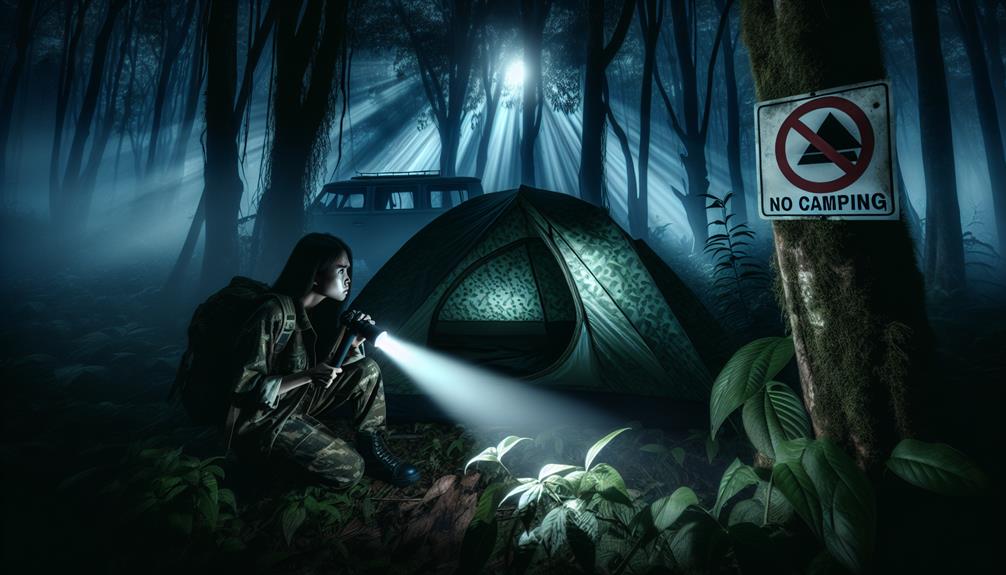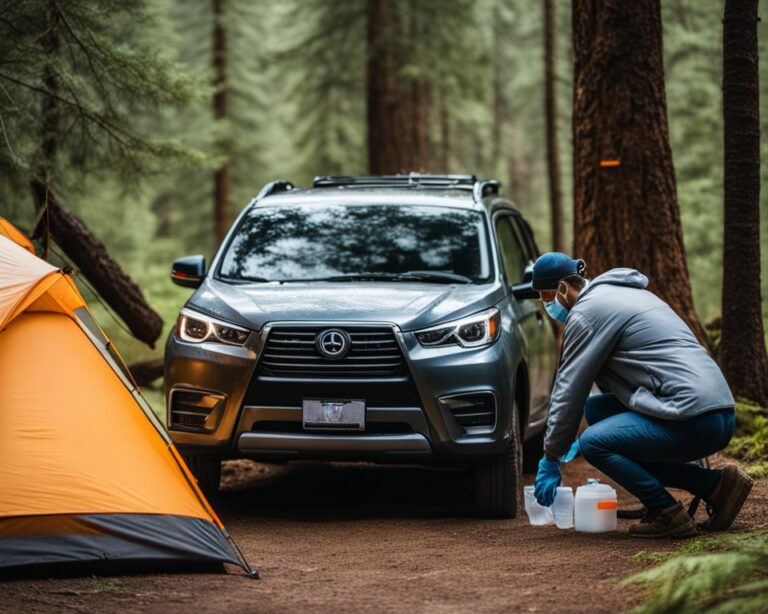Is Stealth Camping Illegal in the USA?
Stealth camping in the USA falls into a legal gray area. The legality depends on following specific land management rules and local ordinances. Regulations can vary widely, so it’s important to research the specific rules where you plan to camp. National parks, state forests, and private properties all have different guidelines. Failure to comply can lead to fines, charges, or harm to the environment and wildlife. Prioritize safety, respect the land, and adhere to camping laws to guarantee a positive experience. Be mindful of the impact of your actions and always prioritize responsible camping practices.
Overview of Stealth Camping Laws
Stealth camping laws in the USA vary by state and municipality, making it important to research and understand the specific regulations in the area where you plan to camp. When selecting a campsite for stealth camping, prioritize Leave No Trace principles by choosing a spot that minimizes your impact on the environment. Look for durable surfaces to set up your camp, at least 200 feet away from water sources. It’s essential to pack out all waste and leave the area as you found it to preserve nature for future campers.
To guarantee your safety while stealth camping, take necessary precautions such as informing someone of your whereabouts and expected return time. Be prepared for wildlife encounters by storing food properly and keeping a safe distance from any animals you may come across. Familiarize yourself with common wildlife in the area and know how to react in case of an encounter. By being mindful of campsite selection, following Leave No Trace principles, and taking safety precautions for wildlife encounters, you can enjoy a safe and responsible stealth camping experience.
National Park Regulations
Within the boundaries of National Parks in the USA, specific regulations govern camping activities to guarantee the protection of the park’s natural resources and wildlife. Camping restrictions in National Parks are put in place to maintain the ecological balance and promote visitor safety. It is vital to adhere to National Park rules to preserve the park for future generations and prevent harm to the environment.
When camping in National Parks, it is essential to follow designated camping areas and obtain permits if required. Most National Parks have designated campgrounds with facilities to accommodate visitors safely. These campgrounds often have regulations regarding campfires, waste disposal, and noise levels to minimize the impact on the park’s ecosystem.
Additionally, camping outside designated areas or practicing stealth camping is strictly prohibited in National Parks. Violating these camping restrictions can result in fines, eviction from the park, or even legal action. By respecting National Park rules and camping restrictions, visitors contribute to the conservation of these natural treasures and ensure a safe and enjoyable experience for all.
State Forest and Wilderness Areas
Camping regulations in State Forest and Wilderness Areas vary depending on the specific location and management policies in place. When camping in these areas, it is important to adhere to camping etiquette and wilderness ethics to guarantee the safety of both yourself and the environment.
State Forests and Wilderness Areas often have designated campsites where camping is permitted. It’s vital to follow these guidelines to minimize environmental impact and preserve the natural beauty of these areas. Leave No Trace principles are especially important in these locations to maintain the ecosystem’s integrity.
Some areas may require permits for camping, so be sure to check with the local authorities before setting up camp. Additionally, familiarize yourself with any fire regulations and wildlife protocols in place to prevent accidents and protect the wildlife.
Respect for nature, fellow campers, and wildlife is key when camping in State Forest and Wilderness Areas. By following camping etiquette and wilderness ethics, you contribute to the conservation of these precious landscapes for future generations to enjoy.
Bureau of Land Management (BLM) Lands
Regulations regarding camping on Bureau of Land Management (BLM) Lands can vary depending on the specific location and management directives in place. When camping on BLM Lands, it is vital to adhere to camping etiquette and respect the land management guidelines set forth by the BLM. Camping etiquette includes practices such as leaving no trace, properly disposing of waste, and minimizing your impact on the environment.
Land management on BLM Lands focuses on preserving the natural resources, wildlife habitats, and cultural sites present in these areas. It is essential to follow designated camping areas, obtain any necessary permits, and be aware of any fire restrictions or seasonal closures that may be in effect. By understanding and abiding by the BLM’s land management rules, you contribute to the conservation and protection of these public lands for future generations to enjoy. Remember to always practice Leave No Trace principles and respect the unique ecosystems found on BLM Lands.
Private Property Considerations
When camping on private property in the USA, it is essential to be aware of the legal implications and responsibilities that come with this choice. Trespassing laws vary by state, but in general, entering someone’s land without permission is illegal. Landowner rights are vital to respect when considering stealth camping on private property. You must obtain explicit permission from the landowner before setting up camp to avoid any legal issues.
Landowners have the right to protect their property, and if they have not granted you permission to camp on their land, you could be subject to trespassing charges. It’s important to understand that even if a property appears unused or abandoned, it doesn’t grant automatic permission to camp there. Always seek permission from the landowner or property manager to avoid legal consequences.
Being mindful of trespassing laws and respecting landowner rights is essential when considering stealth camping on private property. By obtaining permission and following any guidelines set by the landowner, you can enjoy a safe and legal camping experience.
Urban Stealth Camping Restrictions
City ordinances and public land policies play a vital role in regulating urban stealth camping. Understanding the specific regulations in place within each city is essential to avoid legal issues while engaging in stealth camping in urban areas. Be sure to research and comply with local laws to prevent any potential consequences for unauthorized camping in urban settings.
City Ordinances
Urban areas in the United States often have specific local rules and restrictions in place that regulate stealth camping within city limits. City ordinances may include camping bans that prohibit overnight stays in public spaces or urban camping restrictions that limit where individuals can pitch tents or park recreational vehicles. These regulations aim to maintain public safety, protect property, and prevent environmental damage.
When considering stealth camping in urban areas, it is important to research and understand the specific ordinances of the city you plan to visit. Violating these rules can result in fines, citations, or even legal consequences. Many cities have designated camping areas or campgrounds where visitors can legally stay overnight, ensuring a safer and more regulated experience.
To avoid running into issues with city ordinances while stealth camping, it is recommended to check with local authorities, seek permission when necessary, and always abide by the established rules. Respecting urban camping restrictions not only guarantees compliance with the law but also contributes to a harmonious coexistence with the community and the preservation of urban spaces.
Public Land Policies
In public lands within urban areas of the United States, strict policies are enforced regarding stealth camping, aimed at regulating overnight stays and preserving the environment. When considering urban stealth camping restrictions, it is important to understand the camping etiquette and conservation efforts implemented to maintain the integrity of these public spaces.
- Stay on Designated Campsites: Urban public lands often have designated areas for camping to guarantee minimal impact on the environment and wildlife.
- Pack Out What You Pack In: Conservation efforts stress the importance of leaving no trace behind, meaning campers must take all their trash with them when leaving the site.
- Respect Quiet Hours: Many urban areas have specific quiet hours to minimize disturbances to both wildlife and other visitors, promoting a safe and peaceful environment for all.
Consequences of Illegal Camping
Furthermore, unauthorized camping can have detrimental environmental impacts, such as damaging fragile ecosystems or wildlife habitats. Additionally, safety risks like encountering dangerous wildlife or being in unsafe areas are significant concerns when partaking in stealth camping activities. In addition, when engaging in illegal camping, you risk facing legal penalties that can range from fines to potential criminal charges.
Legal Penalties for Camping
Violating camping laws in the USA can result in various legal penalties, including fines, citations, and even potential arrest. When camping on public lands, it is important to adhere to the regulations to avoid facing these consequences. Here are some of the legal penalties you may encounter for illegal camping:
- Fines: Depending on the severity of the violation, fines for illegal camping can range from a few hundred dollars to several thousand dollars. These fines aim to deter individuals from disregarding public land usage restrictions.
- Citations: In addition to fines, campers engaging in illegal activities may receive citations from law enforcement officers. These citations serve as formal notices of the violation and often require a response or appearance in court.
- Potential Arrest: In cases of repeated or severe violations, individuals may face potential arrest for illegal camping. Being arrested can lead to further legal proceedings and a criminal record, impacting future outdoor activities and travel plans.
Respecting camping laws not only ensures your safety but also helps preserve the natural beauty of public lands for all to enjoy.
Environmental Impact Concerns
Illegal camping can have detrimental environmental consequences, impacting ecosystems and wildlife habitats. When individuals engage in unauthorized camping activities, they often fail to follow the principles of Leave No Trace, which are essential for conservation efforts and ecosystem protection. This can lead to a range of issues such as littering, soil erosion, disruption of plant life, and contamination of water sources. Wildlife preservation is also at risk, as illegal camping can disturb natural habitats, causing animals to flee or experience increased stress.
Conservationists work tirelessly to maintain the delicate balance of ecosystems, and illegal camping poses a threat to their efforts. The damage caused by unauthorized camping can have long-lasting effects on the environment, requiring significant resources to restore the affected areas. By disregarding regulations and setting up camp in undesignated areas, individuals contribute to the degradation of natural spaces that are pivotal for biodiversity and ecological stability.
It is essential to respect the environment and adhere to established guidelines to uphold the protection of wildlife, ecosystems, and the overall health of our planet.
Safety Risks Involved
The repercussions of unauthorized camping activity extend beyond environmental harm to encompass significant safety risks for both individuals and the surrounding community. When engaging in stealth camping, it is important to take into account the following safety risks:
- Increased Vulnerability: Illegally camping in secluded areas can make you an easy target for wildlife encounters or criminal activities, putting your safety at risk.
- Limited Emergency Response: Being in areas not designated for camping means limited access to emergency services in case of accidents, injuries, or other unforeseen circumstances.
- Environmental Hazards: Setting up camp in unauthorized locations can expose you to environmental hazards such as flash floods, landslides, or other natural disasters without proper risk management measures in place.
To mitigate these safety risks, always prioritize safety precautions such as informing someone of your whereabouts, carrying emergency supplies, and adhering to designated camping areas for a safer outdoor experience. Effective risk management is key to ensuring a secure camping trip while respecting the laws and regulations in place.
Tips for Responsible Stealth Camping
To guarantee a successful and respectful stealth camping experience, it is crucial to carefully select your campsite and minimize your impact on the surroundings. When engaging in stealth camping, always remember the principles of Leave No Trace. This means leaving your campsite as you found it, without leaving any trash or evidence of your stay. Choose a campsite that is already established to reduce your impact on the environment. Practice ethical camping by avoiding sensitive areas, such as near water sources or fragile vegetation.
Minimize noise and light to maintain a low profile and respect the serenity of nature. Keep your group small to lessen your footprint and reduce the chances of being detected. Be prepared with proper gear and knowledge of local regulations to ensure a safe and responsible experience. Always be aware of your surroundings and be ready to move quickly and quietly if needed. By following these tips, you can enjoy the adventure of stealth camping while preserving the environment for future campers.
Responsible Stealth Camping in the USA for a Safe and Enjoyable Experience
To sum up, while stealth camping may be illegal in certain areas of the USA, it is important to research and understand the specific regulations and restrictions in place. By being informed and responsible, campers can enjoy the beauty of nature without risking fines or legal consequences. Remember to always leave no trace, respect private property boundaries, and follow all established rules to guarantee a safe and enjoyable camping experience.







